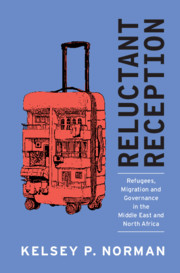Book contents
- Reluctant Reception
- Reluctant Reception
- Copyright page
- Dedication
- Epigraph
- Contents
- Figures
- Tables
- Acronyms
- Note on Translation
- Preface
- 1 Introduction
- 2 Host State Engagement in the Middle East and North Africa
- 3 Egypt
- 4 Morocco
- 5 Turkey
- 6 Differential Treatment by Nationality?
- 7 The Domestic Influence of International Actors
- 8 The Post-2015 Migration Paradigm in the Mediterranean
- 9 Conclusion and Avenues Forward
- Book part
- Notes
- References
- Index
3 - Egypt
From Strategic Indifference to Postrevolutionary Repression
Published online by Cambridge University Press: 26 November 2020
- Reluctant Reception
- Reluctant Reception
- Copyright page
- Dedication
- Epigraph
- Contents
- Figures
- Tables
- Acronyms
- Note on Translation
- Preface
- 1 Introduction
- 2 Host State Engagement in the Middle East and North Africa
- 3 Egypt
- 4 Morocco
- 5 Turkey
- 6 Differential Treatment by Nationality?
- 7 The Domestic Influence of International Actors
- 8 The Post-2015 Migration Paradigm in the Mediterranean
- 9 Conclusion and Avenues Forward
- Book part
- Notes
- References
- Index
Summary
Since the 1990s international organizations and NGOs have provided services for refugees and migrants in Egypt, thereby bringing in international funding that also translates into development funding for the broader Egyptian populace. Even while refugees deal primarily with non-governmental actors for basic services and international protection, they must still go directly to Egyptian authorities to obtain legal residence in the country, making these populations legible to the state. Following the 2011 revolution and the 2013 military coup, a policy of strategic indifference gave way to a more repressive policy that first targeted Syrian refugees and eventually extended to all migrant and refugee nationalities. While a repressive policy required additional expenditures on the part of the Egyptian state, the use of these resources was considered necessary to construct and uphold the regime’s security state, whereby the issue of migration was coupled with terrorism, trafficking, and smuggling. Chapter 3 explores the impact this association has had on human rights organizations attempting to advocate for or assist migrants and refugees, as well as implications for the everyday livelihoods of migrants and refugees themselves.
- Type
- Chapter
- Information
- Reluctant ReceptionRefugees, Migration and Governance in the Middle East and North Africa, pp. 43 - 66Publisher: Cambridge University PressPrint publication year: 2020

